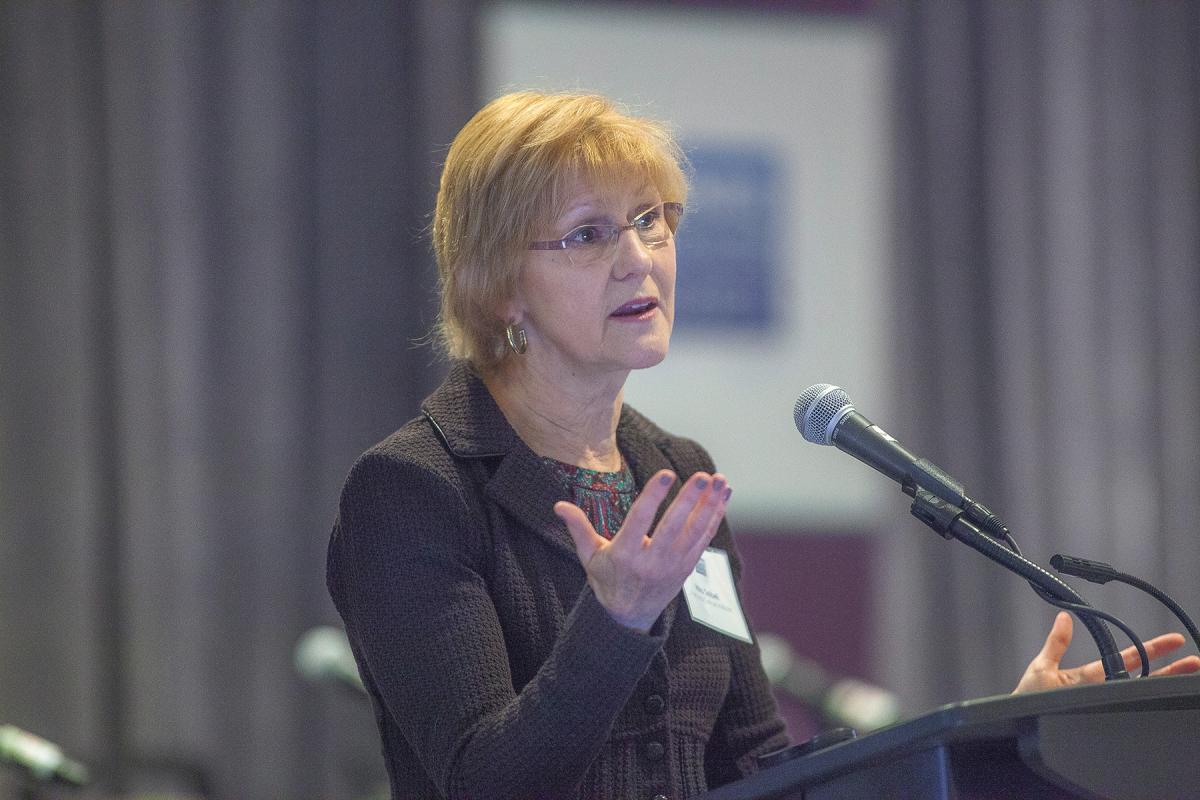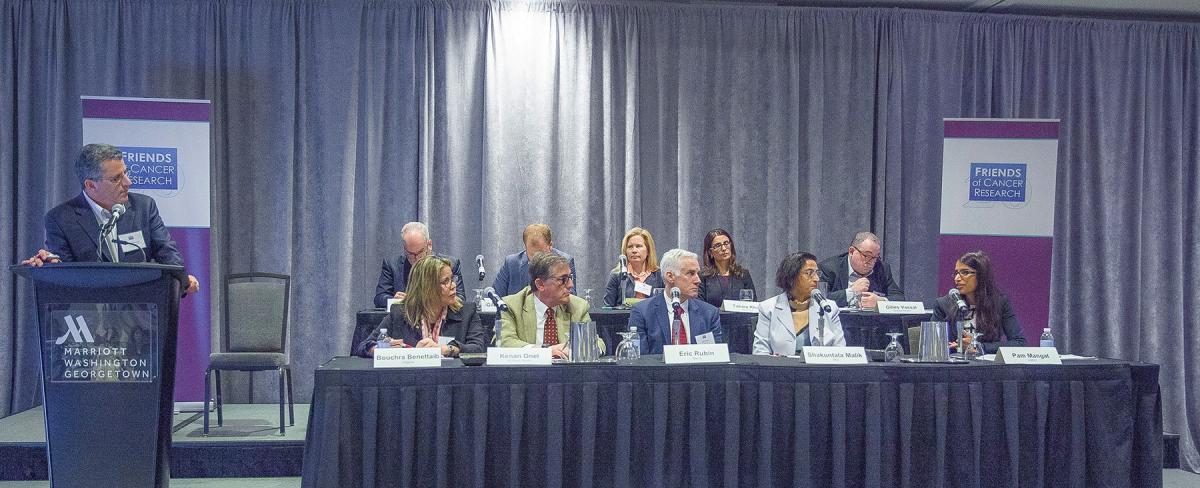
Accelerating Pediatric Drug Development
A Friends of Cancer Research Forum
On Tuesday, February 21, 2017, Friends of Cancer Research (Friends) hosted the Accelerating Pediatric Drug Development forum at the Washington Marriott. The half-day forum brought together clinicians, advocates, academics, and regulators to discuss how best to accelerate pediatric drug development.
Our goal is simple: we have to help children – Ellen Sigal, Friends of Cancer Research
The forum was divided into two sessions to discuss innovative clinical trial approaches, assess the feasibility and potential design of mechanism-of-action based Phase I/II master trial platforms for concurrently studying multiple molecules across a range of relevant pediatric tumor types, and prioritized criteria that may help identify the most promising molecules to take forward from a master trial into pivotal studies.
The first session covered challenges and opportunities in pediatric oncology drug development. Panelists presented and discussed the attributes of on-going and planned trials and strategies for enhancing pediatric drug development. Many of the panelists mentioned the difficulty they have in recruiting children for trials and as Raphael Rousseau, Genentech, said, “Many programs are competing for the same group of patients, and I felt this competition was not healthy and that we needed to work more collaboratively.” Rousseau also touched on a joint FDA/EMA master trial protocol proposal, named iMATRIX, that has been evaluated.
80% of the time, children present stage 3 or 4 – Raymond Rodriguez-Torres, Live Like Bella Foundation
After Rousseau, Gilles Vassal, Gustave Roussy Cancer Centre, explained the European strategy for handling master protocols and trials. Vassal went on to discuss the MOSCATO trial, which recruited 1,000 patients with 73 patients having solid tumors, and mentioned how only one-third matched treatment, further showing a main issue: most patients need a drug that does not yet exist. According to Vassal, the MOSCATO trial is now running at the European level with INFORM in Germany; MAPPYACTS in France, Spain, Denmark, and Italy; and iTHER in the Netherlands. Finally, Vassal discussed the eSMART trial, which is an academic trial of Phase I and II single agent and combo trial platform that needs to be amended and was launched in August 2016. As of February, there were already 31 patients enrolled in the trial for 6 months, and it is set to launch in 5 other countries as of March 2017.
This is the biggest problem in cancer – Gregory Reaman, FDA
Looking to the future, Gregory Reaman, FDA, presented ideas as to how to help accelerate pediatric drug development. After mentioning that there is currently no legislative fix in regards to developing pediatric cancer drugs, Reaman suggested: maximizing regulatory authority, FDA aiding the endeavors as much as possible, expanding opportunities for evaluating precision medicine approaches, taking advantage of paradigm shifts, follow up optimizing Orphan Drug Act opportunities, and pursuing rational science based strategies for when to evaluate new drugs in children and how successfully this can be integrated into existing therapies. Raymond Rodriguez-Torres of the Live Like Bella Foundation echoed Reaman’s sentiments and focused on the need for greater collaboration, particularly with patients, their families, and treating physicians.

Nita Seibel, NCI, presents during session 1
The second session consisted of a panel discussion on considerations for a pediatric master protocol. Within this context, panelists discussed trial design and molecular prioritization criteria; the role of a multi-stakeholder decision-making body and governance; logistical and operational considerations and challenges; and fulfilling regional pediatric regulations and addressing globalization challenges.
One of the main issues described by Rousseau was the fact that no company will be willing to sponsor a drug from another company. He went on to state that the onus is on academia and major institutions like NCI in the U.S. and that industry should be more focused on Phase I and II; if they try mixing portfolios it will be a challenge and this is where collaboration would be required.
Without collaboration, we will never be in position to break through the disease – Kenan Onel, University of Chicago
Another issue brought up during the panel discussion was misalignment of incentives that may hinder robust pediatric drug development due to the high cost and potentially low return on investment. Though incentives exist in the U.S. and EU to help promote pediatric drug development, greater collaboration and cost-sharing efforts through public-private partnerships were posed as potential ways to advance pediatric drug development.
In the final discussion of the panel, Martha Donoghue, FDA, stated that no one involved in the drug development and review process wants to be the barrier to that progress for patients. She also stressed FDA’s commitment to collaborating with all stakeholders, including global health authorities (Japanese, EU, Canadian, Australian), to align pediatric opinions on specific studies and to address disagreements and move things forward. Vassal stated that the regulatory environment is essential to success in this area and that in the EU there needs to be improvement within the regulatory environment. He also discussed the positive aspects of globalization in drug development, and how there is not a need for two drugs on both sides of the Atlantic – that there should be one drug developed and then tested in both areas to see if it works.

Session 2 panelists from L-R: Peter Adamson (moderator), Bouchra Benettaib, Kenan Onel, Eric Rubin, Shakuntala Malik, Pam Mangat; Row 2: Kenneth Cohen, Giles Robinson, Martha Donoghue, Tahira Khan, Gilles Vassal
Ahead of the forum, panelists created a white paper. The event was supported by the St. Baldrick’s Foundation.
Click HERE to view the slides from session one.
Click HERE to view the full meeting agenda.
Click HERE to view the iMATRIX whitepaper.
The working group is currently finalizing a whitepaper that will help inform ongoing policy discussions and provide a scientific framework to assist the development of pediatric master protocols.
Supported by:
![]()

